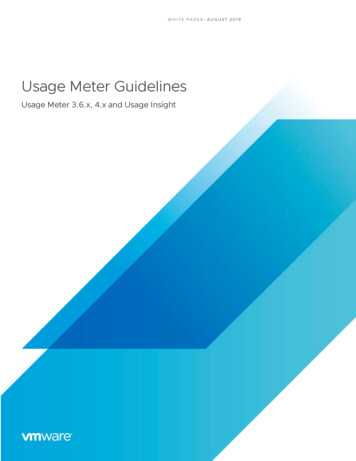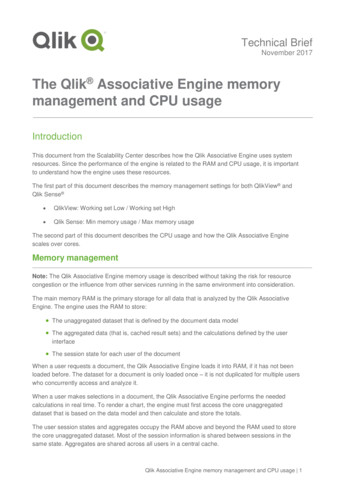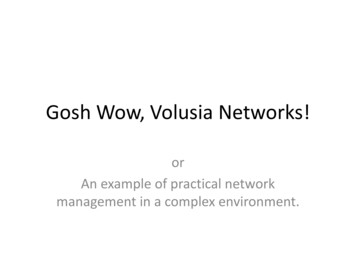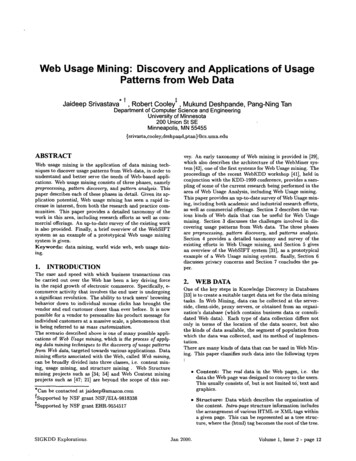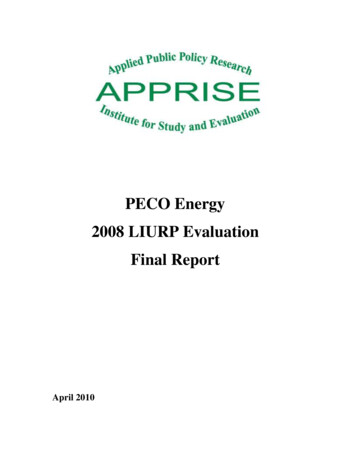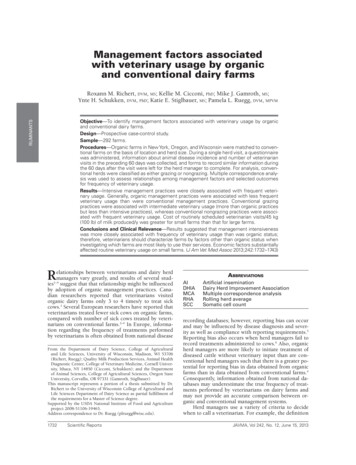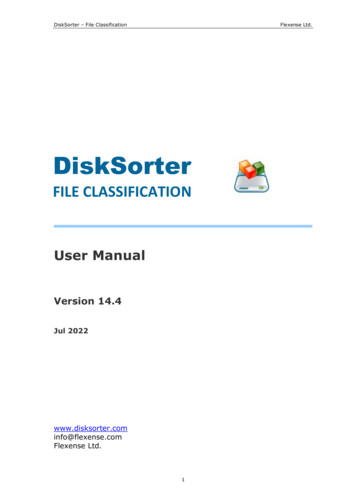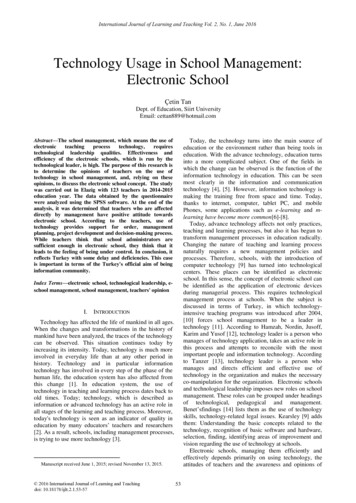
Transcription
International Journal of Learning and Teaching Vol. 2, No. 1, June 2016Technology Usage in School Management:Electronic SchoolÇetin TanDept. of Education, Siirt UniversityEmail: cettan889@hotmail.comAbstract—The school management, which means the use nological leadership qualities. Effectiveness andefficiency of the electronic schools, which is run by thetechnological leader, is high. The purpose of this research isto determine the opinions of teachers on the use oftechnology in school management, and, relying on theseopinions, to discuss the electronic school concept. The studywas carried out in Elazig with 123 teachers in 2014-2015education year. The data obtained by the questionnairewere analyzed using the SPSS software. At the end of theanalysis, it was determined that teachers who are affecteddirectly by management have positive attitude towardselectronic school. According to the teachers, use oftechnology provides support for order, managementplanning, project development and decision-making process.While teachers think that school administrators aresufficient enough in electronic school, they think that itleads to the feeling of being under control. In conclusion, itreflects Turkey with some delay and deficiencies. This caseis important in terms of the Turkey's official aim of beinginformation community. Today, the technology turns into the main source ofeducation or the environment rather than being tools ineducation. With the advance technology, education turnsinto a more complicated subject. One of the fields inwhich the change can be observed is the function of theinformation technology in education. This can be seenmost clearly in the information and communicationtechnology [4], [5]. However, information technology ismaking the training free from space and time. Today,thanks to internet, computer, tablet PC, and mobilePhones, some applications such as e-learning and mlearning have become more common[6]-[8].Today, advance technology affects not only practices,teaching and learning processes, but also it has begun totransform management processes in education radically.Changing the nature of teaching and learning processnaturally requires a new management policies andprocesses. Therefore, schools, with the introduction ofcomputer technology [9] has turned into technologicalcenters. These places can be identified as electronicschool. In this sense, the concept of electronic school canbe identified as the application of electronic devicesduring managerial process. This requires technologicalmanagement process at schools. When the subject isdiscussed in terms of Turkey, in which technologyintensive teaching programs was introduced after 2004,[10] forces school management to be a leader intechnology [11]. According to Hamzah, Nordin, Jusoff,Karim and Yusof [12], technology leader is a person whomanages of technology application, takes an active role inthis process and attempts to reconcile with the mostimportant people and information technology. Accordingto Tanzer [13], technology leader is a person whomanages and directs efficient and effective use oftechnology in the organization and makes the necessaryco-manipulation for the organization. Electronic schoolsand technological leadership imposes new roles on schoolmanagement. These roles can be grouped under headingsof technological, pedagogical and management.Benet’sfindings [14] lists them as the use of technologyskills, technology-related legal issues. Kearsley [9] addsthem: Understanding the basic concepts related to thetechnology, recognition of basic software and hardware,selection, finding, identifying areas of improvement andvision regarding the use of technology at schools.Electronic schools, managing them efficiently andeffectively depends primarily on using technology, theattitudes of teachers and the awareness and opinions ofIndex Terms—electronic school, technological leadership, eschool management, school management, teachers' opinionI.INTRODUCTIONTechnology has affected the life of mankind in all ages.When the changes and transformations in the history ofmankind have been analyzed, the traces of the technologycan be observed. This situation continues today byincreasing its intensity. Today, technology is much moreinvolved in everyday life than at any other period inhistory. Technology and in particular informationtechnology has involved in every step of the phase of thehuman life, the education system has also affected fromthis change [1]. In education system, the use oftechnology in teaching and learning process dates back toold times. Today; technology, which is described asinformation or advanced technology has an active role inall stages of the learning and teaching process. Moreover,today's technology is seen as an indicator of quality ineducation by many educators’ teachers and researchers[2]. As a result, schools, including management processes,is trying to use more technology [3]. Manuscript received June 1, 2015; revised November 13, 2015. 2016 International Journal of Learning and Teachingdoi: 10.18178/ijlt.2.1.53-5753
International Journal of Learning and Teaching Vol. 2, No. 1, June 2016school administrators about the subject. Researches [5],[2] show that the success of technology integrationdepends on the teachers’ demands, their attitudes andbehaviors. Another topic of discussion on the use oftechnology is the infrastructure as hardware and technicalstaff of schools in Turkey and qualification of schoolmanagement. Before analyzing the current situationrelated to the technological infrastructure, discussion onthe process of using technology does not mean anything.Therefore, the use of technology in school managementand the current situation are open to debate in Turkey. Incontributing to this discussion, opinions of teachers onthe subject from schools as an observer may provide aguideline.processes ( X 8 4.58), and prevents the waste of sources( X 11 4.56). According to them, the use of technologysupports the abilities of administrators to plan ( X 15FemaleN33%26.8 4.22), to produce projects ( X 16 4.19), to decide ( X 14 3.85) and it also speeds up bureaucratic processes.However, the teachers are of the opinion that the use oftechnology makes the teachers feel under control andsupervision ( X 28 3.68).According to gender variable, there is significantdifference between teachers' views on the 11.[(MWU 1035.000;p 0,002)]andthe15.[(MWU 967.500; p 0,001)] items. Male teachers(MR2 67.00) adopted the 11. item more than the femaleones (MR1 48.36); and the male ones (MR2 67.75)adopted the 15.item more than the females (MR1 46.32).According to the seniority variable, there is significantdifference between teacher views on the 7. item[(KWH 8.588; p 0,014)]. According to this differencebetween 1-3. groups [(MWU1-3 660.000; p 0,042)], theteachers of science-maths (MR1 45.15) adopted the 7.item more than the teachers of technical education(MR3 36.83). There is significant difference betweenteachers' views on the 8. item [(F2-120 3.879; p 0,023)].According to Scheffe test, the teachers of science-maths( X 1 4.00), adopted the 8. item more than the ones ofMale9073.2social sciences ( X 2 4.46).1-5 year3024.46-10 year3024.411-15 year3024.416 and over3326.8Science-Math4637.4Social Science4133.3Technical3629.3123100.0II.METHODA. Sample and UniverseThe universe of this study is the teachers in Elazig whoworked in 2014-2015 Academic Year. The sample wasformed from 123 teachers who could be accessed fromthat universe. Demographic distributions of teachers areshown in Table I.TABLE I. THE DISTRIBUTION OF TEACHERS IN THE SAMPLEACCORDING TO DEMOGRAPHIC ABLE II. TEACHERS' VIEWS ON THE USE OF TECHNOLOGY INSCHOOL MANAGEMENTItem no7810B. Data and AnalysisThe data in this study were obtained by conducting adescriptive survey model and using a questionnairedeveloped by the researcher. The items of thequestionnaire which is Likert Type were rated as, 1.Totally Disagree (1.00-1.80), 2. Disagree (1.81-2.60), 3.Neutral(2.61-3.40), 4. Agree (3:41 to 4:20) and 5. Totallyagree (4:21 to 5:00).In this study, for the analysis of the data, arithmeticmean, standard deviation and variance analysistechniques, "t" test (for homogeneous materials) withKWH and MW tests (for non-homogeneous material)were used. Significance level was accepted as p 0.05.III.111415163228THE FINDINGSA. Teachers' Perception of Technology in ElectronicSchool and School ManagementAccording to the teachers participated in the study, theuse of technology provides support to schoolmanagement ( X 7 4.75), improves management 2016 International Journal of Learning and TeachingViewsXsThe technology(camera, the internet,smart phones) may contribute toschool managementThe use of technology providessupport to improve managementprocessesThe use of technology providessupportintimeandspacemanagement at schoolThe use of technology at schoolprovides support in preventing wasteof sourcesThe use of technology supports theability of school administrators todecideThe use of technology supports theability of school administrators toplanThe use of technology supports thepotential of school administrators toproduce projectsThe use of technology in schoolmanagementspeedsupthebureaucratic processThe use of technology in managementmakes teachers feel under control 4.22.874.19.874.44.763.681.07B. The Current Situation in the Management ofElectronic SchoolAccording to Table III, the teachers find thetechnological infrastructure and technical staff54
International Journal of Learning and Teaching Vol. 2, No. 1, June 2016(MR1 25.40); and the teachers with (11-15)-yearexperince (MR3 35.90) adopted it more than the oneswith (1-5)-year-experience (MR1 25.10).According to the branch variable, in parametric items,there is significant difference between teachers' views onthe 20. [(F2-120 8.938; p 0,006)] and the 25. items [(F2120 6.268; p 0,003)]. According to Scheffe test, theteachers in technical education ( X 3 3.52) adopted the 20.insufficient in their schools ( X 20 3.00). While theteachers find their administrators sufficient in using thetechnology ( X 18 3.92) and in terms of awareness ( X 13 4.17), they still think that those administrators needtraining in this issue ( X 33 4.12). According to theteachers, software programs are needed for schoolmanagement in Turkey ( X 25 4.48).item more than the teachers of science-maths ( X 1 2.58);and they ( X 3 3.71) adopted the 25. item more than theTABLE III. THE TEACHERS' VIEWS ON THE CURRENT SITUATION INTHE MANAGEMENT OF ELECTRONIC SCHOOLItem no121317181920212533ViewsXsThe management of the school Iwork at use the technologyeffectivelyThe administrators are aware of theimportance of technology in schoolmanagementThe use of technology provides theadministratorswith information indecision-making processThe administrators are sufficient inusing the technologyThe school I work at is sufficient interms of technological infrastructureand equipment3.901.084.17.944.39.733.921.033.291.25The school has sufficient technicalstaff to ensure effective use oftechnology"E-school" and "e-learning" areeffective in the school I work atThe appropriate softwares are neededfor the school management in TurkeyThere is need for training ofmanagers in the use of technology inschool management3.001.334.23.884.48.744.121.07ones in social sciences ( X 2 2.76).According to the branch variable, there is significantdifference between teachers' views on the non-parametric33. item [(KWH 22. 596; p 0,000)]. This difference isbetween the 1.2 groups [(MWU1-2 582.500; p 0,001)].According to this, the ones in social sciences (MR2 52.79)adopted the 33. item more than the ones in science-maths(MR1 36.16).IV.The concepts like electronic school and related to thistechnological leadership reflect on the educational systemin Turkey, even though it is a retarded case. In thisreflection, as external dynamics, the technological trendsover the world; as internal dynamics, the technologyintensive new educational programs such as "e-school","Fatih Project" are effective. It is important to determineteachers' views on how current the electronic school is inTurkey, and what extent the school administrators exhibittechnological leadership behaviours. Because the teachersare responders of school management and good observersof it. The results of the study whose aim is to determineteachers' view on the use technology are summarizedbelow.It is determined that the teachers have a positiveattitude towards using technology in school management(Table II). The positive attitude is more prevalent inyoung teachers and teachers of science-maths. They areof the opinion that the use of technology provides supportmost for the planning process of the management. Thisopinion is more dominant in male teachers. This isfollowed by producing projects and decision-makingprocesses respectively. The teachers think that the use oftechnology speeds up the bureaucratic processes (TableII). These findings are parallel with the ones found bySezer, Deryakulu [15] and [16]. That the teachers have apositive attitude towards using the technology in schoolmanagement has a critical importance in terms of the factthat technology-intensive management and teachingsystems such as "e-school" and "Fatih project" shouldwork. Because it is known that teachers' attitudes areimportant in actualizing all the managerial andeducational practises at schools. That the teachers have apositive attitude towards using the technology in schoolmanagement is parallel with the literature and the relatedresearch findings. In fact, it is known that the schoolswhich use the technology intensively serve better and aremore successful.According to seniority variables, in parametrical items,there is significant difference between teachers' views onthe 20. [(F3-119 8.151; p 0,000)], the 21. [(F3-119 2.867;p 0,011)] and the 33. [(F3-119 10.424; p 0,000)] items.According to Scheffe test, the difference in the 20.item isbetween 1-2. groups. According to this, the teachers withexperience more than 16 years ( X 4 3.55) adopted the 20.item more than the ones with (6-10)-year-experience ( X 2 2.10). The teachers with (6-10)-year-experience ( X 2 4.70) adopted the 21. item more than the ones with (15)-year-experience ( X 1 4.00). The teachers with (1-5)year-experience ( X 1 4.70) adopted the 33. item morethan the ones with experience more than 16 years ( X 4 3.81).According to seniority variable, there is significantdifference between teachers' views on the nonparametrical 12. item [(KWH 10. 439; p 0,015)]. Thisdifference is between the 1-4. [(MWU1-4 297.000;p 0,005)] and the 1-3. groups [(MWU1-3 288.000;p 0,013). According to this, the teachers with more than16 year experience (MR4 38.00) adopted the 12. itemmore than the ones with (1-5)-year-experience 2016 International Journal of Learning and TeachingTHE DISCUSSIONAND RESULTS55
International Journal of Learning and Teaching Vol. 2, No. 1, June 2016management. This conflicting case can be considered asmark of a confusion in the teachers on this issue. This,possibly, depends on their lack of information onelectronic school. If the school managers are insufficientenough to need a training on the technological leadership,then an important risk is waiting for them. This risk is theaddiction of the managers to the technicians [14].That the teachers (especially the teachers of technicaleducation) state that software programs are needed forschool management in Turkey can be considered as animportant offer. Because, each school may have adifferent management policy, since they have their owncharacteristics. This difference on the use of technologyin school management may appear as school-specificsoftwares.However, it is remarkable that the teachers who have apositive attitude towards using the technology in schoolmanagement feel that it also makes the teachers feelunder control and supervision. This case has the potentialto make the teachers feel stressed, nervous and eveninsecure. This means that the methods and the techniqueswe use to solve a certain problem may cause a newer anda deeper problem [14]. One possible reason of this couldbe the fact that the school administrators are not open toimprovement in using the technology. In fact, in aresearch conducted by Brockmeier, Sermon ve Hope [9],it was reached that the school managers have difficulty inhaving information about educational technologies, inunderstanding how to use technologies during teachinglearning process, in their roles of user, partner andfacilitator which support the use of technology. Relyingon the results obtained from the researches in theliterature, it can be said that technology leadership rolesof school managers is important in using the technologyat schools [17]. To overcome this drawback, the schoolmanagement should also include the teachers in planningthe use of technology in management processes. Whileplanning this, social, psychological and pedagogicaldimensions should also be taken into consideration aswell as technological dimension. To do this, it isimportant that the school managers have technologicalleadership qualities. Because, one of the barriers ofintegrating the technologies into all the processes ofeducation is the inadequate technology leadership [18].Because, managerial support is an important factor inintegrating the information and communicationtechnologies with teaching and learning activities andusing it in an effective way [19].The teachers participating in the study found thecurrent infrastructure and the technical staff insufficientregarding the electronic school equipment in the schoolthey work at (Table III). Experienced teachers prioritizethe lack of technical staff. This case, which is in parallelwith other research findings, is an important deficiency.Because, the use of technology in school managementdepends on, above all, the sufficiency of neededinfrastructure and equipment.The teachers think that the school managers are awareof the importance of the use of technology in schoolmanagement, they use this technology effectively andthey are sufficient (Table III). The experienced teachersare more optimistic about this case. These findings aresupported by similar research results [18], [20], [21].That the teachers find their managers sufficient and eagerin using the technology is important in terms of theirtechnological leadership ability. The managers with theseabilities can be models in technological issues. In fact, ina research conducted by Kozloski [9], it is stated thatschool managers are models for their staff to simplify theintegration of the technology, try hard to increase the useof technology and help to train teachers in using thetechnology through training programs. However, it isremarkable that these teachers (especially the youngerones and the ones in social sciences) think that schoolmanagers need training in using the technology in school 2016 International Journal of Learning and 11][12][13][14][15][16]56K. Demir, “School management information systems in primaryschools,” The Turkish Online Journal of Educational Technology,vol. 5, no. 2, pp. 32-45, 2006.R. Çakır and S. Yıldırım, “What do computer teachers think aboutthe factors affecting technology integration in schools?”Elementary Education Online, vol. 8, no. 3, pp. 952-964, 2009.Y. Yiğit, “Relation between attitudes of teachers' knowledgemanagement based on some of the variables and learningorganization (school) perceptions,” Master's thesis, Sivas, 2013.J. Bork, “What is needed for effective learning on the internet?”Educational Technology & Society, vol. 4, no. 3, pp. 139–144,2001.H. J. Becker, “Internet use by teachers: Conditions of professionaluse and teacher-directed student use,” Teaching, Learning andComputing: National Survey Report, 1998D. Keegan and D. Mobile. (2005). Learning: The next generationof learning. Distance Education International. [Online]. g2/files/workpackage5/bookJ. H. Valk, A. T. Rashid, and L. Elder. (2010). Using MobilePhones to Improve Educational Outcomes: An Analysis ofEvidence from Asia. IRROLD. [Online]. 11(1). rticle/view/794/1487A. Uysal, “Arts, changing and transforming in the focus ofdeveloping technologies – an evaluation on arts education,” inProc. National Arts and Technology Education Symposium,Baskent University, Ankara, 27-29 April, 2011.E. Eren and A. A. Kurt, “Technology leadership behaviours ofelemantary school principals,” Usak University Journal of SocialSciences, vol. 4, no. 2, pp. 219-238, 2011.R. Gürbüz, E. Erdem, and K. Yıldırım, “The characteristics ofsuccessful school principals,” Journal of Dicle Üniversity ZiyaGökalp Education Faculty, vol. 20, pp. 167-179, 2013.T. Can, “Technologic leadership proficiencies of secondary schooladministrators in Bolu,” The Turkish Online Journal ofEducational Technology, vol. 2, no. 3, pp. 94-107, 2003.Ö. Hacıfazlıoğlu, Ş. Karadeniz, and G. Dalgıç, “Schooladministrators’ perceptions of technology leadership: An examplefor metaphor analysis,” Journal of Educational Sciences Research,vol. 1, no. 1, pp. 97-121, 2011.S. Tanzer, “Technological leadership capacity of vocational andtechnical school administrators,” Unpublished Master's thesis,Institute of Social Sciences, Abantİzzet Baysal University, Bolu,2004.H. H. Aksoy. (2014). An Analysis Regarding Technology Usagein Eduactional Institutes and Its Effects. [Online]. y/ere/malogluB. Sezer and D. Deryakulu, “The competencies of elementaryschool administrators regarding their technology leadership roles,”Educational Technology: Theory and Practice, vol. 2, no. 12, pp.74-92, 2012.T. Can. Elementary school administrators’ technologicalleadership competencies. [Online]. Available: http://wwwetc2008.home.anadolu.edu.tr/ietc2008/206
International Journal of Learning and Teaching Vol. 2, No. 1, June 2016[17] A. Adıgüzel, “The status of instructional technology in theprimary schools and classroom teachers’ level of using thesetechnologies,” Journal of Dicle Üniversity Ziya Gökalp EducationFaculty, vol. 15, pp. 1-17, 2010.[18] E. Ağaoğlu, Y. Altınkurt, K. Yılmaz, and T. Karaköse, “Opinionsof school administrators and teachers about proficiency of schooladministrators (In Kütahya),”Education and Science, vol. 37, no.164, pp. 159-175, 2012.[19] T. Bülbül and C. Çuhadar, “Analysis of the relationship betweenschool administrators’ perceptions of technology leadership selfefficacy and their acceptance of ICT,” Mehmet Akif ErsoyÜniversitesi Eğitim Fakültesi Dergisi, vol. 12, no. 23, pp. 474 –499, 2014.[20] İ. Çınar, “Competency of educational administrators ininformation management: Sample of Malatya,” in Proc. 13thNational Congress of Educational Sciences, Malatya, 2014. 2016 International Journal of Learning and Teaching[21] M. Çelikten, “Competency of school administrators in computerusage,” Journal of National Education, pp. 155-156, 2002.Assist. Prof. Dr. Çetin Tan. was born inElazig, Turkey, in 1975. He had B.A. degreefrom Firat University in Elazig in 2002, MsEdegree from Firat University in Elazig in 2006and PhD degree from Firat University inElazig 2012.Dr. Tan, whose study field is educationaladministration and planning, distanceeducation and e-learning, has completed hismaster and doctorate degree in the field ofeducational administration. He has many publications which publishedin national congress, symposium and journals. He is working in SiirtUniversity Dept. of Education.57
A. Teachers' Perception of Technology in Electronic School and School Management According to the teachers participated in the study, the use of technology provides support to school management (X 7 4.75), improves management processes (X 8 4.58), and prevents the waste of sources (X 11 4.56). According to them, the use of technology X
